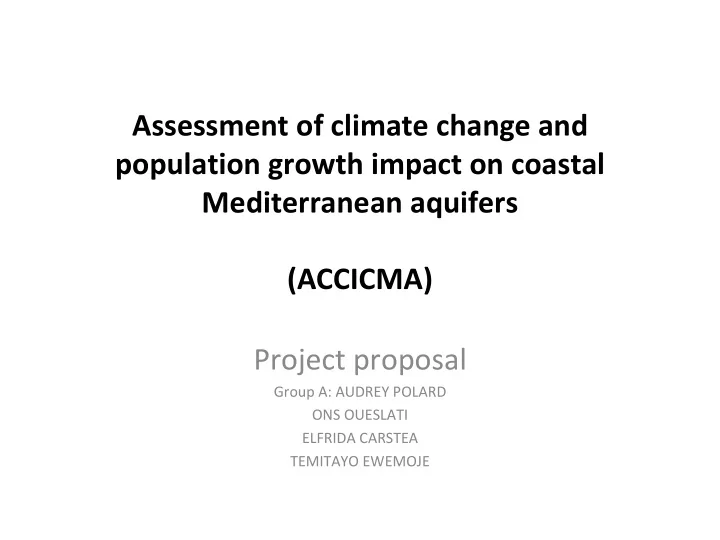

Assessment of climate change and population growth impact on coastal Mediterranean aquifers (ACCICMA) Project proposal Group A: AUDREY POLARD ONS OUESLATI ELFRIDA CARSTEA TEMITAYO EWEMOJE
CONTEXT – state of the art • Climate change has been intensely studied at global scale Few studies which incorporate climate change effect at micro scale
Integrated approach Population growth Greenhouse gases emissions Intensive agriculture Climate change Huge amount of Increased Extreme events Increased sea level fertilizers & pesticides groundwater use Decrease of groundwater level Sea water intrusion Aquifer degradation
IPCC 2001
CONTEXT – social value • Public health • Drinking water more expensive • Perturbation of agricultural and industrial production processes • Population migration • Touristic decrease • Conflicts
OBJECTIVES • Develop an integrated approach for the assessment of climate change and population growth impact on coastal aquifers • Identify the vulnerable zones to pollution caused by contaminants and sea water intrusion • Determine the water quality of studied coastal aquifers • Groundwater flow simulation for “current” and “future” climate
Work packages • Work package 1: Assessment of vulnerable zones to pollution caused by contaminants and seawater intrusion • Work package 2: Monitoring the water quality of the vulnerable areas • Work package 3: Application of ground water flow and statistical downscale climate change models (VISUAL MODFLOW + SEAWAT)
1 st WORKPLAN ‐ year Work package Activities Participant – Estimated scheduled results period Assessment of Exchange between partners Algeria, Italy, vulnerable of knowledge and Tunisia, Turkey zones to information of the aquifer Past and present pollution past and current state (6 months) hydro ‐ geological caused by information contaminants Characterize the hydro ‐ Kick – off aquifer database and seawater geology of Mediterranean Meeting in intrusion coastal countries from the Algeria Identification of last 3 decades the vulnerable coastal zone for Identify the vulnerable Meeting in Italy each participant coastal zone for each country participant country
1 st & 2 nd WORKPLAN ‐ year Work package Activities Participant – Estimated results scheduled period Monitoring the Monitoring the salinity Algeria, Italy, Database with water quality of level of groundwater Tunisia, Turkey current aquifer the vulnerable quality state areas Evaluating the level of (18 months) groundwater contamination by 2 Meetings in efficient sampling Tunisia and Turkey before and after applying fertilizers
WORKPLAN ‐ 3 rd year Work package Activities Participant – Estimated results scheduled period Application of Simulating groundwater Algeria, Italy, Model of the ground water flow with climate Tunisia, Turkey current state flow and change influence for statistical “current” state of the 12 months Model of the future downscale aquifer state of the aquifer climate change Meeting in Algeria models (VISUAL Simulating the future Workshop in MODFLOW + state of the aquifer Tunisia SEAWAT) Transfer of information Public and to local authorities authority awareness Dissemination of results through conferences Two conferences/ At least 1 paper in and published papers each country ISI journal
Consortium
PARTICIPANTS • Turkey: previous experience in studying sea water intrusion to aquifers • Algeria: large Mediterranean coastal zone, significant problems with drinking water extraction • Tunisia: significant problems with water resources • Italy: comparison with a developed country, expertise
PARTICIPANTS + CONTRIBUTIONS • Turkey (20 personnel): Institute of Marine Sciences and Management, Berkarda Lab., Istanbul University • Algeria (15 personnel): Department of Geology, Faculty of Earth Sciences, Annaba Badji Mokhtar University , Department of Civil Engineering, Faculty of Science and Engineering, Skikda University • Tunisia (15 personnel): Direction Generale des ressoures en eaux, Tunis, INAT: Institut National d’Agronomie de Tunis • Italy (10 personnel): Water research institute, Rome • Existent EQUIPMENT
BUDGET • Personnel: 580000 ( 1 PhD student, 2 Research Fellows/country) • Equipment: 80000 (Software, PCs, water analysis equipment) • Consumable: 60000 (GIS and climate data, lab reagents, stationary, meeting organization, field trip expenses) • Travel: 70000 (accommodation, flight tickets/2 meetings/year, national conferences) • Subsistence: 10000 • TOTAL BUDGET: 800000 • TOTAL REQUESTED: 600000
Recommend
More recommend